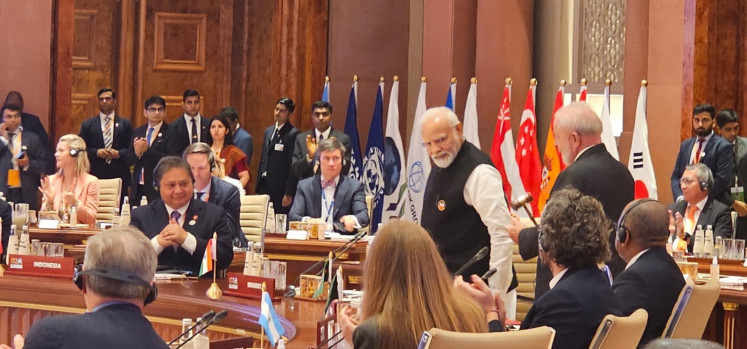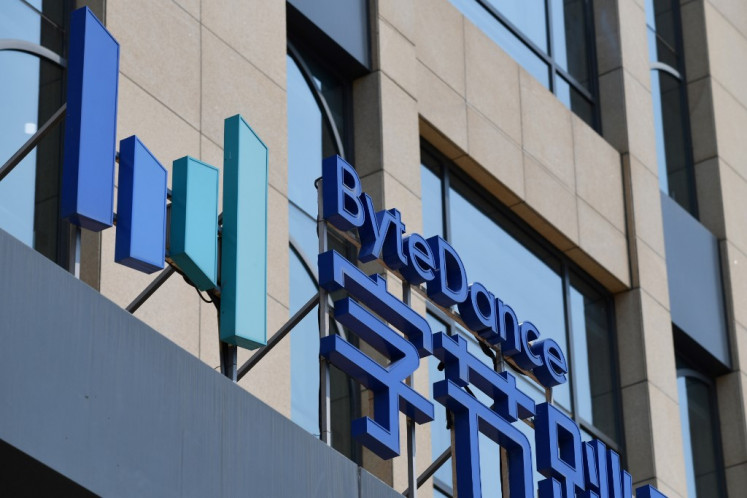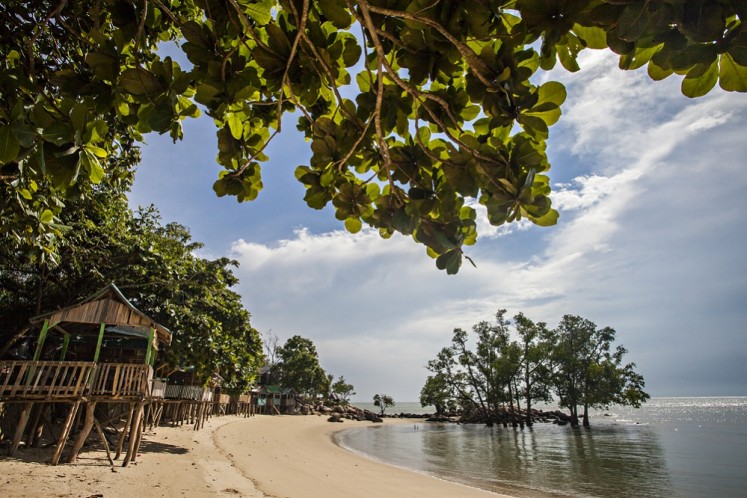Popular Reads
Top Results
Can't find what you're looking for?
View all search resultsPopular Reads
Top Results
Can't find what you're looking for?
View all search resultsIndonesia displays untapped potential amid G20 Summit in New Delhi
Change text size
Gift Premium Articles
to Anyone

President Joko “Jokowi” Widodo traveled to New Delhi to attend the Group of 20 (G20) Leaders’ Summit this past week, accompanied by Coordinating Minister for Economic Affairs Airlangga Hartarto.
His visit marked the end of Indonesia’s role as a troika partner for the economic forum. The troika role is defined by the member countries who led the group for the past three years, which are Italy, Indonesia and India, in that order.
The forum served as a platform for world leaders to discuss geopolitics and geostrategic maneuverings, as well as various developments on building sustainable economic opportunities for Indonesia and Southeast Asia.
Throughout the forum, it was evident that Indonesia collaborated with major economies toward strengthening and diversifying trade and investment for all. This is essential to future-proof the country’s transformation by expanding market access and growing industries to embrace a new, green economy.
Leaders adopted the G20 Framework for Mapping Global Value Chains to help identify risks and build resilience. Indonesia’s policymakers will use this tool to promote value-added production by optimizing critical raw materials, forestry, fisheries and agricultural commodities, as well as developing the region into a global hub for electric vehicle (EV) production.
It is hoped that by following this framework, Indonesia can also continue to build and empower the middle class and micro, small and medium enterprises (MSME), who have long been known as the backbone of the country’s economy.
Furthermore, the forum also presented an opportunity for Indonesia to reinforce a rules-based global order to ensure fair and predictable guidelines that enable all countries to compete on a level playing field, which are especially important for the country as a vast and diverse maritime trading nation.
These basic building blocks have strengthened Indonesia’s free and open market-based economy and integration across Southeast Asia for decades, supporting regional stability and prosperity.
Indonesia enthusiastically advocated for and welcomed the G20 leaders’ re-commitment to a robust World Trade Organization (WTO) as the core of the multilateral trading system, bearing in mind that free and fair trade in environmental goods and services is fundamental for comprehensive climate change action.
The WTO dispute-settlement mechanism has the ability to integrate developing countries into an inclusive global trading system while protecting all players from coercive economic power through its fully functional appellate body.
Indonesia is confident that the mechanism will help the country to resolve pending WTO disputes, including those related to food and feed crops for biofuels, which have been in the pipeline for several years.
At the forum, New Delhi also pledged “to avoid discriminatory green economic policies.” This is in line with the G20’s desire to appoint an independent, fair and reliable referee that has the ability to call out and eliminate discriminatory practices, protectionism and market-distorting policies.
As the effects of climate change plague several countries across the globe, major G20 economies are rolling out activist policies to future-proof their industries in a race for technological advancement in energy, defense and other sectors.
Last year, the United States secured its 2022 Inflation Reduction Act, comprising a US$370 billion package of grants, loans, rebates and incentives to accelerate investment in clean-energy solutions and strengthen supply chains. Meanwhile, China faces its own economic challenges, as it develops new growth sectors, such as green energy, health care, artificial intelligence (AI) and advanced semiconductors.
Indonesia, as a newly upper-middle-income country, is currently prioritizing the development of the country’s infrastructure, to build schools, railways and hospitals, to increase investment in skilled people, and empower local communities for a just and inclusive transition. At this point, the country is focusing on unleashing the potential of entrepreneurs and the private sector to embrace diverse economic opportunities and achieve industrial self-sufficiency.
Through the implementation of the Job Creation Law under President Jokowi’s administration, the government hopes that it can become a vehicle to attract new sources of investment for green industrialization and develop new services industries, especially for Indonesia’s cultural and creative sector, as a sub-national driver of inclusive growth.
In New Delhi, Indonesia strategically positioned itself as a country at the forefront of climate action, and a state adamant on preventing deforestation. The country also conveyed its untapped potential in the green economy, with the vast landscape it can offer.
To reach net-zero emissions by 2050, trillions in climate finance and investment are needed, including developing countries requiring U$4 trillion per year for clean-energy technologies by 2030. Indonesia holds a wealth of critical minerals necessary to produce critical technologies for decarbonization, like batteries, photovoltaic panels, semiconductors and wind turbines required to electrify energy end-use.
The G20 leaders also launched the Global Biofuels Alliance (GBA) as a sideline event of the summit. The GBA aims to serve as a catalytic platform, fostering global collaboration for the advancement and widespread adoption of biofuels, given the importance of biofuels in zero- and low-emissions strategies.
Another topic that was discussed during the summit was the circular economy and recycling. Leaders recognized the potential benefit of circularity as a new revenue source for local governments, SMEs and communities by monetizing waste and cropping byproducts.
Increasing biofuel production and use by heavy vehicles and hard-to-abate industries would help to eliminate air pollution. According to the International Energy Agency, Indonesia has the potential to be a global biofuels leader because of the biofuel resources that are available across the archipelago.
Finally, forests are crucial ecosystems and act as carbon sinks at the global and local levels for the environment, climate and people. G20 leaders are committed to restoring at least 30 percent of all degraded ecosystems by 2030.
As a member country, Indonesia is confident that this will be achieved by scaling up efforts toward land degradation neutrality and mobilizing new and additional finance for forests from all sources, including concessional and innovative financing. Likewise, this is another significant economic and environmental opportunity for the people of Indonesia because of the rich diversity present in the country.
At the end of the summit, New Delhi passed the gavel of the G20 to Brazil for the next presidency. Indonesia vowed to promote and increase multilateralism in the coming years.
This article was published in collaboration with Coordinating Ministry for Economic Affairs Republic of Indonesia











